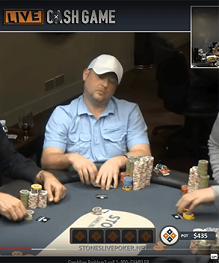The most interest-drawing topic in the poker world in recent months, the outing of alleged cheating by Mike Postle during dozens of “Stones Live” podcasts and a $10 million lawsuit subsequently filed by a lengthy list of alleged victims, is back in the news after two months of only very minor developments.
This time out, it’s about another development in the case — actually publicly discovered by yours truly — that will be likely be of trivial legal importance in the long run. However, it’s exactly the type of side story that sets observers’ tongues wagging, especially in a case where everyone wants to know the latest but actual news has been slow to emerge.
About the only advancement in the case in December was that co-defendant Kings Casino, the parent company of Sacramento’s Stones Gambling Hall, had agreed with plaintiffs’ counsel to waive the formal service of paperwork regarding the filing of the suit. Such waivers happen all the time, and it was the second such waiver here, matching one already agreed to between plaintiffs and another co-defendant, Justin Kuraitis, in November. The reasons for these waivers are simple; they get everyone involved on the same page and help the whole process move forward in an orderly manner.

Yet there was an interesting entry amid the legalese: a declaration that the primary figure in the lawsuit, Mike Postle (right), had yet to be served. While I wrote up a story about the minor news for another site, including the curious note about Postle, I also queried the plaintiffs’ attorney, Maurice “Mac” VerStandig, about the Postle-service entry.
VerStandig didn’t reply. That happens a lot in legal cases, as lawyers won’t or can’t speak on the record about matters that are still fluid. So I waited, checking the case’s official docket every few days for updates on this or other case matters. My patience was rewarded about a week ago, when I discovered that VerStandig himself had filed an interesting supplement to a procedural entry regarding serving a case summons on Postle, in which VerStandig alleged that Postle had intentionally been evading service regarding the lawsuit.
It turned out that serving Postle with the notice of the federal lawsuit had been an ongoing and difficult problem, though whether it’s “evasion” is up to the court (or our readers) to decide. In the wake of the lawsuit’s filing in October, Sacramento defense attorney William Portanova represented himself as Postle’s lawyer to local news outlets, including the Sacramento Bee. Then, according to VerStandig’s filing, VerStandig had communicated with Portanova, asking whether Portanova would accept service on Postle’s behalf.
Portanova told VerStandig he’d ask Postle if that would be okay, but then never got back to VerStandig. Instead, over the following days or weeks, Verstandig attested to making at least three more calls to Portanova, none of which were returned. Finally, when the two connected, Portanova asserted that he was only a criminal attorney and did not represent Postle in civil matters. It seems like that could have been said however many weeks earlier, when the two first spoke or exchanged e-mails, but lawyers just gotta lawyer, one supposes.
Anyhow, when combined with other matters, it seemingly created a lengthy delay in attempting to serve Postle with the summons. Sometime in early December, plaintiffs’ attorney VerStandig hired a Sacramento process server. The process server tried for most of December and into January to serve Postle, with no luck.
Details on the process server’s attempts weren’t available when I wrote my earlier feature, though they have since been filed as part of the case. The process server first tried to catch Postle at his last publicly known address, on December 16, in the eastern Sacramento suburb of Rancho Cordova, but learned that Postle hadn’t lived there for roughly three years.
A more detailed address search uncovered Postle’s current residence in the northern Sacramento suburb of Antelope. The home is just a 10-minute drive from Stones Gambling Hall, where all the alleged cheating occurred. The process server renewed his efforts, making six separate trips to the home at varying times of day over two weeks, the last visit coming on January 2, 2020.
On most of these visits Postle’s home was dark, but on at least two of the process server’s trips, Postle’s black SUV was present, though no one answered the door.
After the failed January 2 attempt, Verstandig tried to serve the summons himself. On January 3, he visited Postle’s home, found the SUV present and the lights on, but no one would answer his doorbell rings or knocks, which he continued for eight (!) minutes.
VerStandig then retreated to his car and watched and waited for more developments. Through a window, he then observed a figure he believed to be Postle moving inside. (Verstandig played in at least one of the “Stones Live” games with Postle, so he knew Postle by sight.) VerStandig then returned to the door and knocked and rang the doorbell some more… and still no response.
All this led to VerStandig filing the initial service-evasion complaint just two days later. The process server’s declaration and a second Verstandig notice were filed several days after that. That second VerStandig filing notes that a formal summons has also been mailed to Postle’s current address, an alternate form of legal service permissible under California law.
What it all means is that in any event, Mike Postle will be forced into court at some point to answer the claims. That much is inevitable.
One odd thing is that despite Postle’s own apparent seclusion in recent weeks, apparent friends of his are mounting a publicity pushback of sorts. Among the most curious items of late was a blog published on a site called “RounderLife”, associated with an old Gulf Coast poker magazine of that name that ceased publication a decade ago.
The piece attempted to attack the mathematical claims that Postle may have won as much as $300,000 during the several dozen sessions where the alleged cheating occurred, and that the methodology used to make those claims was in itself laughable. While it’s true that the methodology needs verification, the RoundersLife blog was itself a massive red herring; the claims of cheating were based on multiple factors, including highly implausible lines of play by Postle in big pots that invariably resulted in huge profits. And even if Postle won only a smaller fraction of $300,000, he still exceeded by several variance sigmas the returns that even a player on the heater of a lifetime could expect.
If one believes in Occam’s Razor, then the sole conclusion from that is that Postle cheated. Whether I or any of our readers do believe in that truism is, however, a separate matter. I prefer to keep digging out the facts. And it turned out that Postle was or is a part of that old “RounderLife” magazine. One outlet claimed that Postle actually founded the mag, but I can’t speak to that. What I can attest to (and have downloaded) is an issue of RounderLife that shows Postle, then living in his native Mississippi, as running promotions and marketing for the magazine:

It could have been Postle himself who posted that article, though it could also have been a close friend. Postle has been employing, or at least allowing, his network of good-ol’-boy friends to try to shoot holes in the plentiful allegations and evidence he faces. A couple of those even attacked me and my piece about VerStandig’s evasion allegations. Not to worry; that stuff comes with the territory.
In any event, the whole Postle affair remains a lightning rod for the poker world. We’ll return to the story, here at the KAP blog, when further interesting developments arise.
